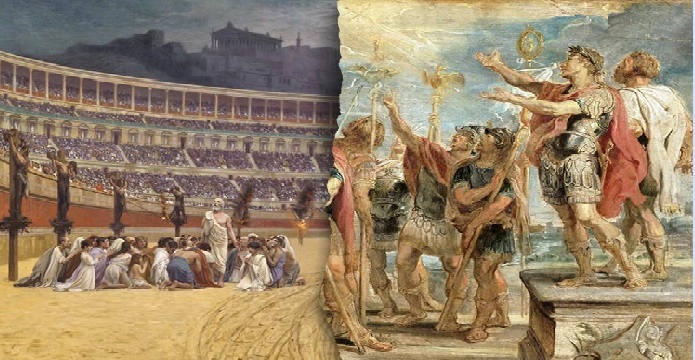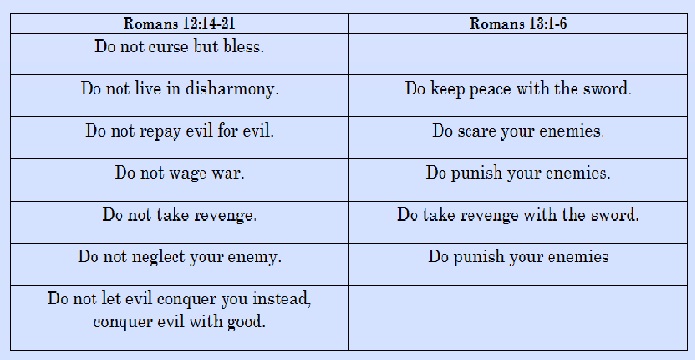From the 3rd century A.D. most theologians…have focused solely on the statements of Paul in Romans 13 and preached total submission to authority. They have done this without taking into account the context of the statements. They have even fixed on one statement in particular: “All power comes from God.”
This has been the leading theme in 16 centuries of cooperation between church and state: omnis potestas a Deo [all power from God]. Some bold theologians added per populum (by way of the people), but this was a mere detail as compared to the imperious duty of obeying the power that is from God as though it were itself God.
The curious thing is to see how theologians fared when often to their embarrassment they had to do with tyrants. A strange casuistry was adopted to explain that power comes from God only when it is gained in a legal, legitimate, and peaceful way and exercised in a moral and regular way. But this did not call into question the general duty. Even at the time of the Reformation Luther used this text in the Peasants’ War to charge the princes to crush the revolt. As for Calvin, he insisted that kings are legitimate except when they attack the church. So long as the authorities let Christians freely practice their religion, they cannot be faulted. As I see it, we have here an incredible betrayal of the original Christian view, and the source of this betrayal is undoubtedly the tendency toward conformity and the ease of obeying. However that may be, the only rule that has been gathered from the vast array of texts is that there is no authority except from God.
As in the case of all biblical texts (and all other texts!) we must first refuse to detach one phrase from the total line of thinking. We must put that phrase in the general context. Let us, then, take Paul’s argument as a whole.
In Romans 9-11 Paul has just made a detailed study of the relations between the Jewish people and Christians. A new development then begins which will cover chs. 12–14 and at the heart of which is the passage that we are now considering. This lengthy discussion begins with the words: “Do not be conformed to the present age but be transformed by the renewal of your mind.” Paul’s general and essential command, then, is that we should not be conformists, that we should not obey the trends and customs and currents of thought of the society in which we live, that we should not submit to the “form” of them but that we should be transformed, that we should receive a new form by the renewing of the mind, that is, by starting from a new point, namely, the will of God and love. This is obviously a strange beginning if he is later to demand obedience to political authorities! Paul then goes on to teach at length about love: love among Christians in the church (12:3-8), love for all people (12:9-13), and love for enemies (not avenging oneself, but blessing those who persecute), with a further exhortation to live peaceably with all (12:14-21). The passage on the authorities follows next. Then all the commandments are summed up in the commandment of love and of doing no wrong to others (13:8-10). In ch. 14 some details are offered as to the practice of love (hospitality, not judging others, supporting the weak, etc.).
This, then, is the general framework or movement within which the passage on authority occurs. It seems so odd, so out of joint, in this larger context that some exegetes have thought that it must be an interpolation and that Paul himself did not write it. For my part, however, I believe that it has its place here and that it does come from the apostle. We have seen that there is a progression of love from friends to strangers and then to enemies, and this is where the passage then comes. In other words, we must love enemies and therefore we must even respect the authorities, not loving them but accepting their orders. We have to remember that the authorities have attained to power through God. Yes, we recall that Saul, a mad and bad king, attained to power through God. This certainly does not mean that he was good, just, or lovable. Along the same lines one of the best commentators on the passage, Alphonse Maillot, relates it directly to the end of ch. 12: “Do not let yourself be overcome by evil, but overcome evil with good. Let every person (therefore) be subject to the higher authorities. …” In other words, Paul belongs to that Christian church which at the first is unanimously hostile to the state, to the imperial power, to the authorities, and in this text he is thus moderating that hostility. He is reminding Christians that the authorities are also people (there was no abstract concept of the state), people such as themselves, and that they must accept and respect them, too.
At the same time Paul shows great restraint in this counsel. When he tells them to pay their dues — taxes to whom taxes are due, revenue to whom revenue, respect to whom respect, honor to whom honor — we are rightly reminded of the answer of Jesus regarding the tax. Far more boldly Jesus claims that we owe neither respect nor honor to magistrates or the authorities. The only one whom we must fear is God. The only one to whom honor is due is God.
We must pray for the authorities. We have quoted the passage in which Paul asks that prayer be made for kings — the plural shows that we cannot expound this as we did in the case of i Peter — namely, for those in authority, for the government. This verse confirms what I said above. Paul is saying in effect that we are to pray for all people. Included are kings and those in high office. We are to pray even for kings and magistrates. We detest them, but we are still to pray for them. No one must be excluded from our intercession, from our appeal to God’s love for them. It might seem completely crazy, but I knew some German Christians who were in the resistance movement against Hitler, even to the point of plotting his overthrow, and who still engaged in prayer for him.[1] We cannot want the absolute death of political foes. Certainly our prayer will not be a kind of Te Deum. It will not be prayer that they remain in power, that they win victories, that they endure. It will be prayer for their conversion, that they change the way they behave and act, that they renounce violence and tyranny, that they become truthful, etc. Yet we still pray for them and not against them. In Christian faith we will also pray for their salvation (which is obviously not the same thing as the safety of their kingdom). This prayer must still be made even if from a human standpoint there is no hope of change. We must not forget that these passages on respect and prayer were probably written at the very moment of the first persecution under Nero, or shortly after it. We thus have to say to Christians, as Paul does in Romans 13, that even though you are revolted by persecutions, even though you are ready to rebel, instead pray for the authorities. Your only true weapon is to turn to God, for it is he alone who dispenses supreme justice.
[1] It is not out of place to recall that the only ones to organize resistance to Hitler after 1936 were German Protestants of the Confessing Church.




